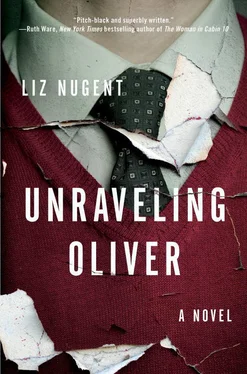On the first day I reported for duty in the library, Jean-Luc was there also and Monsieur asked me to take a seat while he read his grandson a story. I was intrigued. Jean-Luc formally stepped forward and shook my hand. I knelt down to his eye level and returned his greeting with a little bow. He laughed and looked up at his grandfather and, pointing at me, he called me “Frown.”
As Monsieur began to tell the story, I watched the boy’s face as he perched on his papi’s knee. He was transfixed by the tale of a happy young prince of a fantastical land and would exclaim in the middle of the telling, would hide his eyes at the arrival of the bad witch, and clap his hands in excitement at our hero’s escape in the end. I realized that Frown was a character who protected the Prince, and that the Prince was clearly modeled on Jean-Luc. I, too, thought the story was wonderful and said so to Monsieur d’Aigse. He was very happy to be complimented and explained that he had written a series of these stories on and off over the last decades, but that they consisted of handwritten notes. He wasn’t even sure how many stories there were. He had developed a palsy in his right hand and could no longer trust his own penmanship. My task, he said, was to write up all these stories in some expensive leather-bound books he had bought for the purpose. It was to be our secret. He thought his daughter would disapprove that I was not being used for estate work, but I think she very quickly guessed what I had been employed to do. She did not interfere, however.
As I heard his stories, I thought they were good enough to send to a publisher, but Monsieur insisted that they were written solely for his family and that when Jean-Luc was older, he could decide what to do with them.
Laura began to complain bitterly that I was not spending enough time with her. She was right. I was enjoying myself with my two companions, and on several occasions I was invited to dine with the family. Madame Véronique was a little more distant than her father and son, but I loved being there with them and was reluctant to leave when the working day was done.
I tried to humor Laura, promising that I would devote the next night to her, but I rarely kept those promises. The old man treated me like a son. He thought I was a good man. A family was more seductive than anything she could offer me, although I continued to sleep with her because, after all, a man has needs.
• • •
As I set about typing these stories and then laboriously pasting them into the leather-bound books, I found myself growing closer to the old man and the little boy. I was included in their secret world, and they accepted me without question. I couldn’t get enough of their company, and it suddenly seemed to me as if I had somehow been wasting my time with Laura, as if no mere romantic relationship could be worth more than this platonic one between three menfolk who might, in some realm of possibility, have been three generations of the same family. I lost almost total interest in her affection and her vibrancy, and by now used her only for sex. All of the things in which I had previously delighted were now meaningless, as if the spell of the enchantress were broken. This new connection felt somehow purer.
For the first time in my life, I felt able to confide my private thoughts. I told Monsieur of my father’s lack of interest in me. He was clearly appalled and he shook his head in wonder, as if to say, “How could a man not be proud of this boy?” and I loved him for it. He suggested that there was enough transcribing work to keep me busy for more than one summer, and I agreed enthusiastically to return the following year.
The truth is that I didn’t want to leave. There wasn’t that much time left. The idea of returning to my drab and lonely bedsit filled me with revulsion, and even thoughts of Laura’s affection failed to quell my growing anxiety about the future.
At this time, I was worried about my prospects. I had not the family support that most of my fellow students had, and my existence in Dublin was hand to mouth. I hid it well, bought good secondhand clothing, borrowed books, stole stationery, and when in private survived on tea, bread, and whatever fruit I could scrounge from the market. I let my friends think my parents lived in the countryside somewhere and never allowed any visitors to my bedsit. I stayed in their homes and met their families and got more insight into how the other half lived. I desperately wanted what they had, but there seemed to be no way for me to achieve it. I was jealous of their lifestyle and their lack of anxiety about what lay ahead. I was headed for the lowest rung of the civil service, without the all-important contacts that everybody else seemed to have or the financial backing to set them up in business. When I borrowed the fare to France, Father Daniel very gently informed me that he could not continue to fund my life beyond college. We were both mortified. I was grateful for everything he had done for me. He again suggested that I could come back to the school and teach, but that was now out of the question. I had finally escaped boarding school and there was no way I was going back. I was getting plenty of female attention, but I foresaw that when it came to marrying time, no family of good standing would allow their daughter to hitch herself to a penniless nobody. I needed a plan.
What could I do to force the d’Aigses to invite me to stay here with them? How could I endear myself to Monsieur d’Aigse to the extent that he would “adopt” me? I probably could have seduced Madame Véronique if I’d put my mind to it, but I was not attracted to her, and regardless, my dream future entailed my being accepted as me, without pretense. I did not want to live a lie. Not then.
My French was good enough to be able to converse with the locals. I knew of Monsieur’s several acts of bravery during the war. He was a hero in the commune. Could I be a hero too? What if I were to save a life? I began to fantasize about how I could achieve Monsieur’s iconic status. It amused me in my idle hours to imagine being embraced as one of their own. What if I could save Jean-Luc’s life? Wouldn’t that earn their loyalty and gratitude? Wouldn’t they beg me to stay and live with them forever, as part of the family, their protector? But I reasoned I could never save Jean-Luc’s life without jeopardizing it, and that, obviously, was out of the question. Still, I couldn’t shake off my romanticized dreams of the future. It became as real to me as if it had already happened, and I regarded the old man and his grandson with ever growing affection.
Then, I thought, what if I were to save the château? Surely that would be on a par with saving a life. And maybe it was something I could engineer if I put my mind to it. The idea came together slowly over several weeks—though in the beginning I believe I thought of it as comforting fantasy rather than a plan; something to puzzle over, as if teasing out a mathematical equation. But gradually I began to look around with a sense of purpose. I scrutinized the château in a new way.
It struck me that fire was something I understood. Any boy who spent time in a boarding school was well versed in the art of pyrotechnics. It is said that necessity is the mother of invention, but often it is in fact boredom. We knew what burned fastest, loudest, and most colorfully. We knew what caused explosions, what made a damp squib, how to cover up the smell of sulfur. I knew how to start a fire, and I also knew how to contain it.
The harvest started in early September, so all hands were required in the vineyard, but by then I knew my way around the ground floor of the house and I knew that the most flammable part of it must be Monsieur’s library, with its dusty collection of books, maps, and ancient ledgers detailing the commerce of the house over centuries. If I could be the first on the scene, if I could save the house, then I would be the hero. I could be employed to restore the library to its former glory. I was the only person who knew where everything in it was kept. Surely, Monsieur would see the wisdom of keeping me on? He would blame himself: a spark from his pipe must have escaped unnoticed, he would think, and smoldered slowly until it caught fire.
Читать дальше












